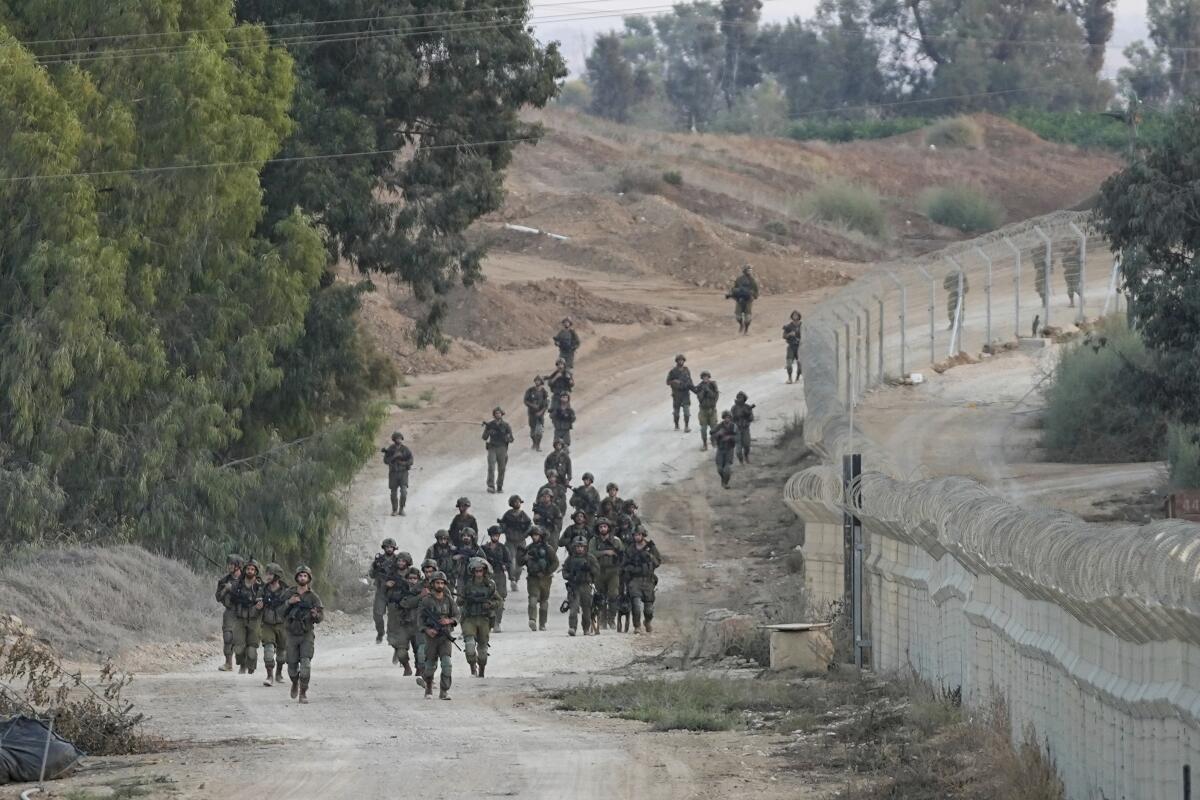Opinion: The Hamas attack on Israel reflects an intelligence failure. But that’s not the worst failure

As Israel steps up a counteroffensive in the Gaza Strip, questions remain about Hamas’ surprise invasion of the country. Chief among them: How could the Palestinian Islamist group use hang gliders, motorbikes and bulldozers to conduct the most devastating attack in 50 years against Israel, home of the most powerful military in the Middle East.
About 6:30 a.m. Saturday, Hamas launched more than 3,000 rockets and sent an estimated 1,000 fighters into Israel from Gaza. Despite the scale and scope of the attack, Israeli and American officials said they had no specific warning that Hamas “was preparing a sophisticated attack that required coordinated land, air and sea strikes,” the New York Times reported.
Many political and military analysts have criticized Israel for that apparent intelligence failure. But the success of Hamas’ surprise attack also indicates an operational failure: a fundamental misunderstanding of the enemy’s nature regardless of specific intelligence.
There’s something deeply troubling about the discussion over Israel’s failure to prevent the attacks. It assumes the terrorists have no agency in choosing not to engage in barbarity.
I conducted hundreds of tactical, operational and strategic missions based on intelligence over the course of my military special operations career. But I never expected intelligence to be perfect, and it rarely was.
I based my plans on the best intelligence available, but I also thought of every scenario I could to prepare for anything the enemy might throw at me. It seems the Israelis didn’t do that.
If an intelligence failure is defined as “when something bad happens to you and you didn’t know about it,” as the late U.S. Sen. Warren Rudman once described it, then Hamas’ surprise attack on Israel clearly revealed an intelligence failure. No one seems to know why the Israelis were unable to anticipate the attack, and it may be many months before the Israelis can answer that question.
By rewarding Israel’s far-right extremists and castigating the moderates, Prime Minister Benjamin Netanyahu believed that he had finally found the solution to the Middle East conflict.
Israel’s government historically has been perhaps the world’s best at penetrating terrorist organizations, which are extraordinarily difficult to infiltrate with informants. The country’s defense relies on early warnings to prevent rocket attacks and border crossings.
But intelligence can do only so much. The other key piece of defense is understanding how your enemy thinks and operates. And the Israelis appeared to struggle on that score too.
The 40-mile-long security barrier that separates Gaza from Israel, known as the “Iron Wall,” was completed in 2021 at a cost of $1.1 billion. The 20-foot-tall fence is equipped with hundreds of cameras and sensors that can trigger automated machine gun fire.
But the wall was not effective against the surprise attack. Hamas was able to breach the barrier in multiple locations and conduct its attacks without much initial resistance.
The staircase in my building is considered safer than our apartment during a rocket attack. But its windows face Gaza, and if a rocket hits the building, we’ll die. That’s my life right now.
Israel’s air defense system, known as “Iron Dome,” was designed to protect its citizens from rocket attacks emanating from Gaza. Completed in 2011, the system has cost the U.S. government nearly $3 billion to develop and maintain. Until last week, it had a 90% to 97% rate of success in striking down enemy rockets.
While Iron Dome worked well when militants launched relatively few rockets, it was less effective against Hamas’ attack Saturday. When the group launched thousands of rockets into Israel in just 20 minutes, the system was overwhelmed. The quantity “was simply too much for Iron Dome to manage,” according to an analysis by the Modern War Institute at West Point.
Hamas’ attack was not particularly sophisticated or innovative. It was essentially a textbook military operation involving ground, sea and air attacks.
The Israelis could and should have anticipated such an attack, even if not on this scale. Given that Hamas’ fundamental goal is “destroying the state of Israel,” Israel could have developed a defense plan that does not rely on inherently unreliable intelligence.
The ancient Chinese military theorist Sun Tzu famously stressed the importance of knowing the enemy. “If you know the enemy and know yourself,” he wrote in “The Art of War,” “you need not fear the result of a hundred battles.”
The Israelis’ problem — and that of many modern militaries — is that they have become too dependent on intelligence instead of developing a deeper understanding of their enemies’ goals, thinking and operations. That knowledge may not prevent the next surprise attack, but it could help prepare an effective defense.
Liam Collins was the founding director of the Modern War Institute at West Point. He is a retired Army Special Forces colonel and a co-author of “Understanding Urban Warfare.” This article was produced in partnership with the Conversation.
More to Read
A cure for the common opinion
Get thought-provoking perspectives with our weekly newsletter.
You may occasionally receive promotional content from the Los Angeles Times.













